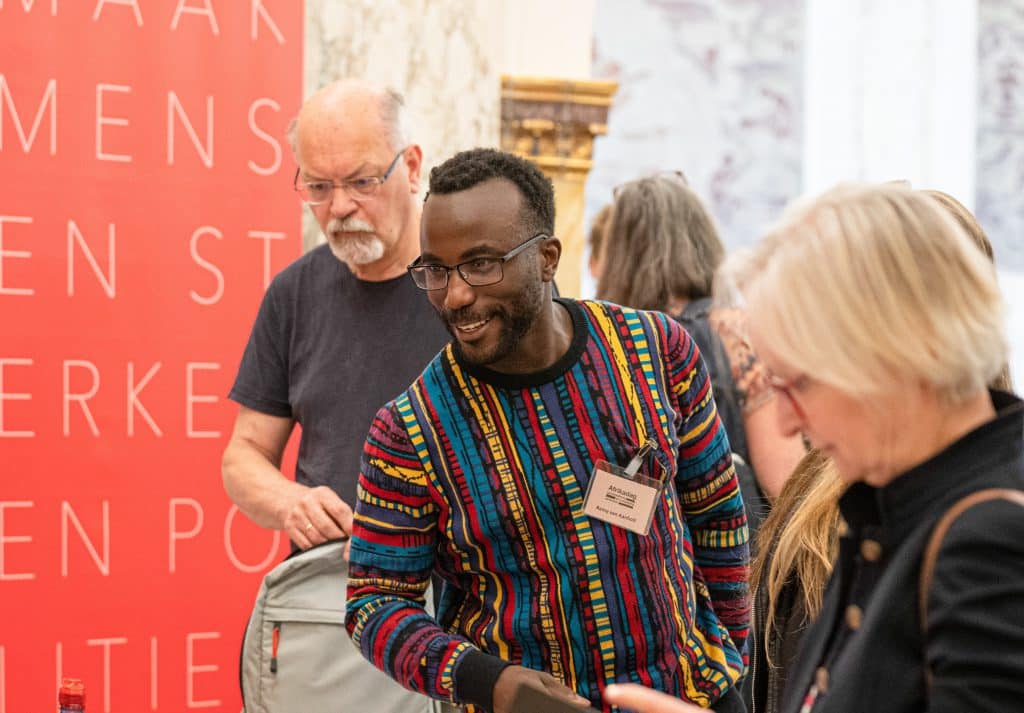After three wonderful years, Remy has decided to realise his ambitions for a fairer world in another workplace. From 1 August, he will start working at the Judicial Council in The Hague. It is with pain in his heart that he is leaving the FMS, as these were three special years. On his last day at the office, Remy looks back on this, in a candid conversation with colleague Max Landheer.
Describe the FMS in three words
Justice. Freedom. Self-development.
What will you miss most about the FMS?
Surely those are my colleagues. The FMS is a very nice young club of people together. The same goes for all our partners abroad. I have really become friends with some people, especially our contacts from the SD platform in Armenia and Ukraine. For example, I'm going to a friend's wedding in Armenia later this year. But with our partners in northern Macedonia, among others, I also maintain good contacts. One of them calls me just about every day these days.
How did you ever join the FMS?
At the time of my internship in Ghana, I came across the FMS through a vacancy, somewhere on the Africa Day website. The FMS was looking for an Africa Day intern and then I immediately thought: nice! I had my interview via Skype (Zoom did not yet exist at the time) with FMS Director Arjen Berkvens and Senior Policy Advisor Anne van der Meer. The connection was terrible, but nevertheless it clicked well from both sides right away.
What experience (on a trip) has stayed with you the most?
The first times you met partners, in Ukraine for example, were very special. Because you had already had a lot of contact via phone and Zoom, it felt like you had known them for years once you then saw them in real life for the first time. I was really welcomed there as a family friend. Perhaps most memorable was an evening out with the entire family of one of the founders of the SD platform. The kids were even along for the ride.
We have been very committed to the SD platform in Ukraine recently. How do you see the war developing?
I actually see it going two ways. On the one hand, I don't think Russia will stop until they control much of Ukraine. Also, especially as the West continues to supply heavy weapons, I think Putin will continue to throw everything into the fight precisely to avoid losing face. In particular, I very much fear that neighbouring Moldova will be drawn into the war, as Russia wants to control the corridor towards Transnistria. On the other hand, I also think a status quo could emerge as it did in the Donbas in previous years: a front that shifts little, but does split Ukraine is two. Indeed, the war is costing Putin enormously. Analysts say he now has to deploy obsolete weapons and rows of young soldiers are buried in Siberia. How do you explain that to your people when it is a "special military operation"?
What is the thing you have done at FMS that you are most proud of?
Let Me Say This was a video project I was ultimately very proud of. In it, we offered a virtual stage to activists in the countries the FMS is active in. It was a very nice project at the time of Corona. Precisely because work was at a standstill for many people during that period, a video project like this allowed you to continue to support partners and give them encouragement.
What exactly will you be doing at the Judicial Council?
The Council of the Judiciary is an independent government body. It manages all the finances of courts and tribunals in the Netherlands and makes policy when it comes to the judiciary. I get to work in the 'International' department. They have network of partners inside and outside the EU. For example, they ran a project that involved cleaning up the legal system in Ukraine. A kind of pre-vetting procedure. I will maintain the network within the EU and, for example, receive visitors from outside the EU as well. The Dutch legal system has a lot of prestige internationally and we like to share information about it with interested parties.
What experiences and knowledge do you take from the FMS into this?
All my knowledge from Eastern Europe and the Western Balkans first. Hopefully we can start some projects there as well. I also do take with me the realisation of how important democracy and the rule of law are for all of us, although we may sometimes take it for granted. I realise very well why we need to support other countries in strengthening democratic institutions and legal systems. I will continue to be able to do that in this position at the Judicial Council, whether in a different guise or not.
Interview by Max Landheer





